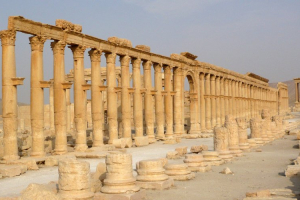Fighters with the Islamic State extremist group have destroyed parts of Syria's historic Palmyra Columns by tying three people to them, and then blowing them up, a shocking new report has revealed.
Rami Abdel Rahman, head of the Syrian Observatory for Human Rights, told the AP that on Sunday, the jihadist fighters "tied three individuals it had arrested from Palmyra and its outskirts to the columns... and executed them by blowing up" three columns.
Khaled al-Homsi, an activist from Palmyra, said ISIS had yet to inform local residents who the executed individuals were or why they had been killed: "There was no one there to see (the execution). The columns were destroyed and IS has prevented anyone from heading to the site," he said.
Mohammad al-Ayed, an activist from Palmyra, said they are certain ISIS destroyed the historic structure for media attention.
"The columns were archeological, and there are many like them still present in Palmyra," he told the AFP. "IS is doing this for the media attention, so that IS can say that it is the most villainous, and so it can get people's attention."
Over the past months, ISIS has captured large swathes of territory across Iraq and Syria in an attempt to create a "caliphate", or state ruled by Sharia Law. In May, the hardline Muslim group seized Palmyra, which stands in the desert about 150 miles northeast of Damascus, the Syrian capital, and is a Unesco World Heritage site.
Over the past several months, the group has destroyed multiple sites and historic artifacts within the city, including the ancient temples of Bel and Baal Shamin.
In the past, ISIS has widely publicized images of its fighters blowing up tombs and destroying statues and religious imagery that it considers blasphemous. It views both Christian "pre-Islamic religious objects or structures sacrilegious," wrote Sturt Manning, chairman of Cornell University's Department of Classics, in an opinion piece for CNN.com. "It seeks to destroy diversity and enforce narrow uniformity. Evidence of a tolerant, diverse past is anathema," he said. "What it fears is memory and knowledge, which it cannot destroy."
In May, the hardline group released a video showing child executioners being forced to slaughter a group of more than 25 regime soldiers in the ancient city's grand amphitheatre.
In August, militants tortured and beheaded Palmyra's 82-year-old former antiquities director, reportedly because he refused to reveal the location of the ancient city's gold and silver treasures.
"It's as though there is a curse that has befallen this city and I expect only news that will shock us," Syria's current antiquities chief Maamoun Abdulkarim told Reuters earlier in Octorber. "If the city remains in their hands the city is doomed."
UNESCO said earlier this month there would be no impunity for war criminals and it would make every effort, in co-operation with the International Criminal Court, to ensure the perpetrators were tried and punished.
"This new destruction shows how terrified by history and culture the extremists are, because understanding the past undermines and delegitimizes the pretexts they use to justify these crimes and exposes them as expressions of pure hatred and ignorance," it said in a statement.

















